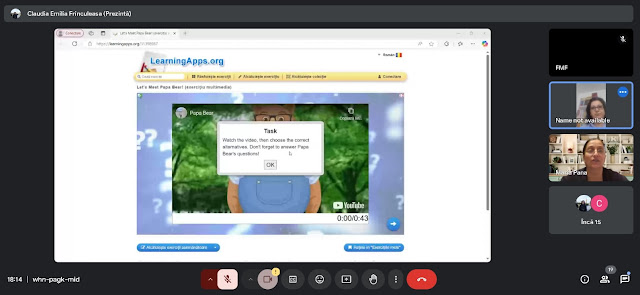On 27 November 2024, the teachers of English on the Buzău Valley participated in the webinar entitled “Digital Assessment Tools for
Innovative Teachers of English”, whose main focus was on
showcasing some resources and tools which can be used to improve the results
of the Romanian students by making the teaching-learning-assessment cycle a more
enjoyable and positive experience for everyone involved.
Formal evaluations, especially the traditional pen-and-paper
methods, are supposed not only to measure the students’ understanding, skills
and progress toward learning objectives or hold students, teachers and schools
accountable for meeting educational standards. Their purposes are also to
provide constructive feedback to the learners about their performance and help
both the teacher and the students to identify strengths and weaknesses, more
exactly to detect areas for improvement, the so-called ”learning difficulties”,
in order to address them and make plans for remodelling instruction and
remediation.
Some disadvantages of traditional assessment methods include excessive stress and anxiety which may negatively impact the students’ performance and well-being, a focus on rote memorization and surface learning (also known as short-term recall over deep understanding), all these to the detriment of higher-order thinking skills, creativity or real-world problem-solving abilities. Traditional assessment hardly finds any room for personalized learning which is considered one of the best conditions for success.
As teachers, when we think about our limited material resources such as paper and
printer ink, and an even more limited non-material resource which is our own time, our 21st century assessment methods really need to become friendlier, more
adaptable and flexible, incorporating more sustainable, accesible and efficient technology-supported alternatives.
So, how can digital resources improve the situation? To begin with, they do offer ehanced engagement – as all these apps, quizzes, games, animations, simulations are more attractive and interactive, they increase curiosity, create interest, boost motivation and encourage the students’ creative and critical thinking and their problem-solving skills. Secondly, digital evaluation resources reduce stress as they are first and foremost self-assessment tools, they almost always involve a form of positive feedback for finishing task or making progress (such as praise, badges, points etc.), they allow for repetition/multiple opportunities to perform a task or answer a question and may as well incorporate the learners’ previous knowledge and experience as well as some of their preferences if they are created by their teacher. Moreover, open educational resources can be easily adapted to meet the individual learner’s needs offering differenciated assessments for different levels of proficiency, learning speed and style. Nevertheless, these resources shouldn’t ignore or neglect the National Curriculum requirements or the general and specific competences promoted in it.
PARTICIPANT LIST
Event: The Pegagogical Meeting of the Teachers of English on the Buzău
Valley
Date: 27/11/2024
Venue/Organiser: online/Liceul Teoretic “Radu Vlădescu” Pătârlagele
|
No. |
Participant’s
Name |
School |
|
|
Bucur Orania |
Școala Gimnazială Comuna Cislău |
|
|
Buriu Roxana |
Școala Gimnazială "Vasile Voiculescu" Comuna Pârscov |
|
|
Cernat Daniela Elena |
Școala Gimnazială "Pamfil Georgian" Gura Teghii, Școala Gimnazială Comuna Pănătău, Liceul Teoretic "Nicolae Iorga" Nehoiu |
|
|
Chirilus Elena Gabriela |
Liceul Tehnologic Sfântul Mucenic Sava, Berca |
|
|
Costache Mădălina |
Școala Gimnazială „Vasile Voiculescu” Pârscov, Școala Gimnazială "Ing. Oprișan Iarca" Unguriu |
|
|
Neacșu Mihaela |
Liceul Teoretic “Radu Vlădescu” Pătârlagele |
|
|
Neculai Florian |
Școala Gimnazială Sat Cândești |
|
|
Pană Maria |
Liceul Teoretic "Nicolae Iorga" Nehoiu |
|
|
Pelmuș Florina Gabriela |
Școala Gimnazială Lunca Priporului |
|
|
Rusti Elena Cristina |
Școala Gimnazială Viperești |
|
|
Tănăsescu Cristina Florentina |
Liceul Teoretic "Nicolae Iorga" Nehoiu |
|
|
Tătulescu Daniela |
Școala Gimnazială Sat Cândesti Liceul Tehnologic Sfântul Mucenic Sava, Berca |
|
|
Teeru Elena Loredana |
Școala Gimnazială Bâscenii de Sus, com. Calvini Școala Gimnazială Nr.1 Cătina |
|
|
Teodorescu Violeta |
Liceul Teoretic „Radu Vlădescu” Pătârlagele |
|
|
Vasile Elena-Luminița |
Școala Gimnazială Comuna Pănătău |
|
|
Vioiu-Giubegan Maria |
Școala Gimnazială Cozieni |


.jpeg)
.jpeg)




.jpeg)
.jpeg)
.jpeg)
.jpeg)

No comments:
Post a Comment